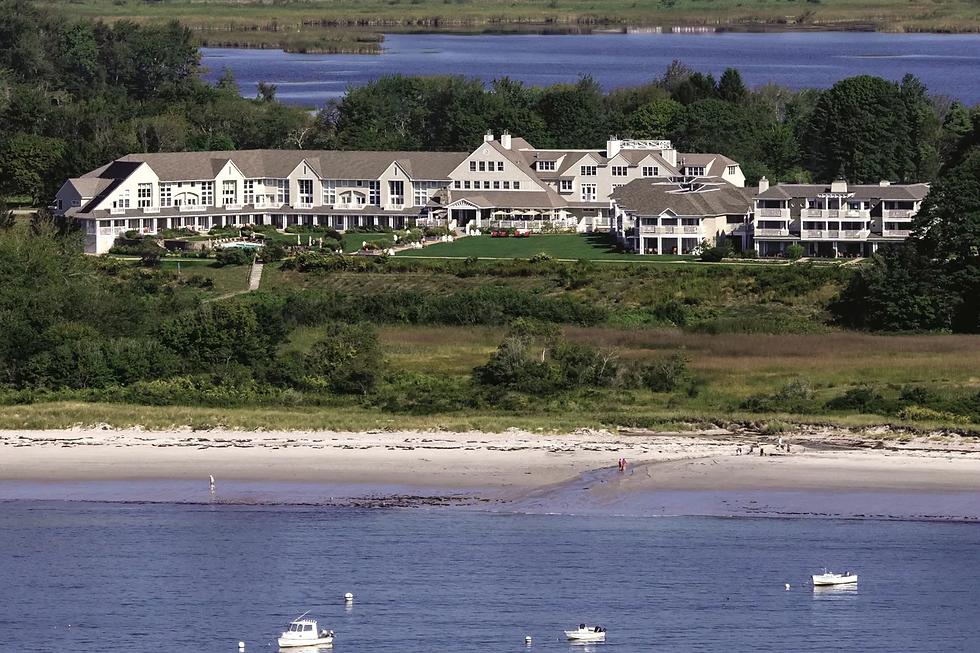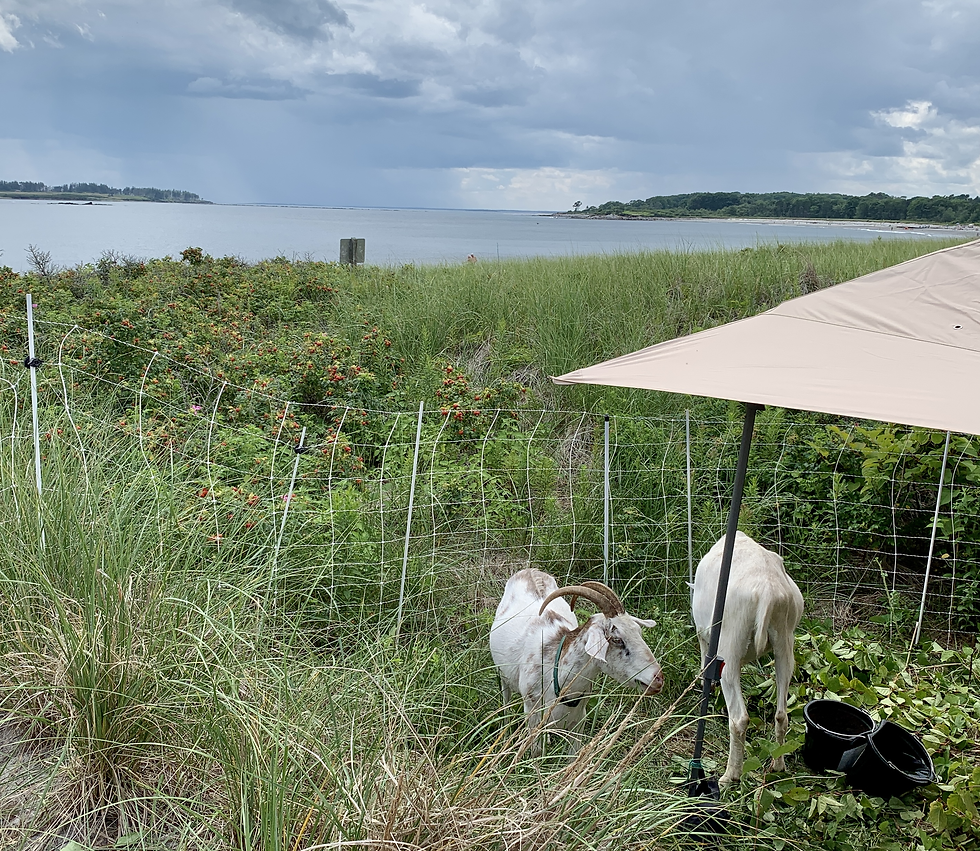Sustainability, Not Just a Stay: Lessons from Inn by the Sea
- Luca Forcella
- Jul 1
- 5 min read
Tucked away in Cape Elizabeth, Maine, Inn by the Sea is more than just a serene vacation destination — it’s built on three clear values: environmental responsibility, community connection, and intentional hospitality. When I spoke to Rauni Kew, the Inn’s PR and Green Program Manager, I didn’t just learn about the certifications the hotel had received. I discovered what it truly means for a hotel to live out those values, from restoring wildfire-damaged land to helping rescue dogs find loving homes. What stood out to me after our call was Rauni herself, and the way she spoke about each initiative in a way that wasn’t rehearsed or surface-level. It was passionate, honest, and filled with decades of research and effort. I left the conversation feeling like I had just met someone who embodies sustainability, not just promotes it. That shifted my perspective: I realized that real change in the travel industry isn’t about checking boxes, it’s about people like Rauni, who choose to do the right thing every single day, even when it’s not easy or flashy.

Talking to Rauni Kew, I quickly realized that Inn by the Sea wasn’t just a hop onto the sustainability trend; they were leading the way in terms of sustainability way before others caught on. In 2007, they earned a LEED Silver certification, becoming one of the first hotels in the U.S. to achieve this distinction. Although this recognition was a milestone for them, it was not their ultimate goal.
From using recycled sheetrock in renovations to installing dual-flush toilets that significantly reduce water usage, the Inn’s sustainable features aren’t just decorative; they are carefully chosen to create a long-term impact. These choices are implemented in collaboration with local contractors and backed by seasonal staff training, ensuring everyone—from housekeeping to facilities—knows how to uphold the Inn’s standards. The Inn borders Crescent Beach State Park, and that border inspires many of the inn’s long-lasting initiatives. Its native plant gardens, created with input from local ecologists, are pesticide-free and irrigated with an innovative system that limits runoff. These gardens support pollinators, rabbits, and birds that the coastal development would otherwise threaten. For the Inn’s team, protecting this ecosystem is a personal matter. As Rauni told me, “The health of the Inn is tied to the health of Cape Elizabeth.” That mindset is what gives their initiatives real results.
From the many stories Rauni told me, one of the most powerful was when she discussed the Inn’s tree-planting program. Through its partnership with Hotels for Trees, for every reservation, they plant a single tree to help restore wildfire-damaged land, such as Colorado’s Spring Creek Zone. The Inn has helped donate over 7,000 trees, marking a significant contribution to the 300,000 trees needed to fix the land.
What sets this initiative apart is that the trees come from Indigenous-run nurseries in New Mexico, representing an impact that is not only environmental but also economic and cultural. For example, these nurseries support indigenous communities that lack job opportunities and funding, but more importantly, they keep the tradition alive. This model reflects a hotel that incorporates sustainable values into its regime, and not just uses them as a marketing tactic, like many other hotels do.

During our conversation, Rauni shared a story that truly stayed with me, about a dog named Doris. She is one of over 90 rescue dogs who have spent time at the Inn through its partnership with the Animal Refuge League of Greater Portland. Guests have the option to walk with them, play with them, and sometimes, have the opportunity to adopt them. If I were to stay at The Inn by the Sea, I would take full advantage of this opportunity because I love dogs and would be open to adding one to the family. Rauni spoke with such joy when discussing how many guests return with photos and stories of their experiences with the rescue dogs. For many, their stay at the Inn marked the beginning of something unexpected yet beautiful, because of the opportunity to take a dog home with them. At the Inn, dogs aren’t just welcome, they are a part of the experience, which makes the Inn so magical.

I was also very curious about Sea Glass, the Inn’s restaurant that sources locally. It reshapes how the word “local” is defined. Their chef collaborates with 29 nearby farms, as well as the Gulf of Maine Research Institute, to feature underutilized species like hake and pollock on their menu. These are fish that are abundant yet often overlooked, which means that cooking with them can help protect the environment. Sourcing locally is important because it reduces the carbon footprint of food transport and builds real connections between food producers and the kitchen, making the food incredibly fresh.
A myth that Rauni helped me debunk was that sustainability means sacrificing comfort. She mentioned that one night at Inn by the Sea would convince anyone otherwise. Rooms come with glass water bottles refilled from Lake Sebago, not single-use plastics. Sheets and towels aren’t changed unless you ask — and nobody minds. Most guests appreciate the intention behind it.
What makes this feel luxurious is not the gold-plated accessories that some luxury hotels have. It is the care that is put in, how the room is prepared, and how kind and warm the staff are to you. It’s thoughtful, calm, and honest. That’s a kind of luxury I wish more places offered.
Though it may seem easy, Rauni discusses how building community isn’t something that comes easily. Rauni was honest about the challenges: retraining seasonal staff, reminding people how to compost properly, and making sure values don’t get lost in the rush of peak season. Sustainability, she told me, isn’t a finish line — it’s something you recommit to every day. The good news, though, is that travelers are also changing. Guests no longer expect daily sheet changes or tiny plastic bottles; they want purpose, presence, and connection. People aren’t just looking for a getaway; they are looking for a community.
My time speaking with Rauni reminded me that true sustainability isn’t just about big, grand gestures; it's more about quiet, consistent choices that ripple outward. Inn by the Sea doesn’t just talk about being eco-friendly, it lives it, with its amazing initiatives that allow people to take a little bit of the Inn home with them. It showed me that where we stay matters, not just for our experience, but for the impact we leave behind. Maybe, the future of travel doesn’t have to be dependent on escaping the world, but more so finding new ways to care for it.


Comments